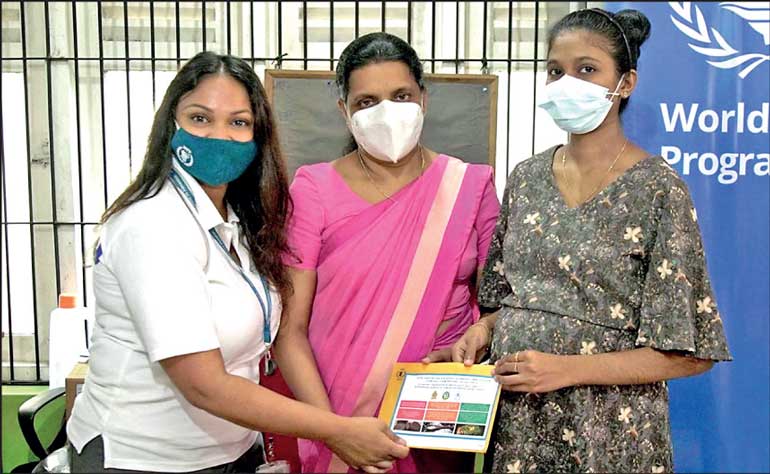Friday Feb 20, 2026
Friday Feb 20, 2026
Saturday, 18 June 2022 00:00 - - {{hitsCtrl.values.hits}}

World Food Program, Sri Lanka Head of Resilience Emergencies and Social Protection Rushini Perera (left) presents the voucher to a pregnant mother (right). Maternity and Child Welfare Centre in Wasala Road, Colombo 13. Medical Officer Dr. L.N.N. Vithana is also present
|
The United Nations World Food Program (WFP) this week began distributing food vouchers to pregnant women in underserved districts of Colombo, marking the start of WFP’s emergency response in the country.
WFP is working to provide lifesaving food, cash and voucher assistance to three million of the most vulnerable people who can no longer meet their food needs due to Sri Lanka’s unprecedented economic crisis.
The monthly vouchers are valued at Rs. 15,000 ($ 40) and will enable more than 2,000 women to buy much-needed food, and are delivered alongside antenatal care provided by the Public Health Division of the Colombo Municipal Council (CMC).
Food inflation in Colombo set a record high of 57.4% in May, and widespread shortages of fuel for cooking and transport means poor families are struggling to afford food. Nearly five million people, or 22% of the Sri Lankan population, are food insecure and in need of assistance. Nutritious foods, such as vegetables, fruits and protein-rich products are now out of reach for many low-income families.
WFP’s recent surveys indicated 86% of families are resorting to at least one coping mechanism, including eating less, eating less nutritious food and even skipping meals altogether.
“Pregnant mothers need to eat nutritious meals every day, but the poorest find it harder and harder to afford the basics. When they skip meals they’re putting their and their children’s health at risk,” said WFP Deputy Regional Director for Asia and the Pacific Anthea Webb.
“Poor families in cities and those who work on estates have seen their incomes drop while market prices have soared. Each day that passes sees an increase in food and fuel prices globally, making it vital that we act now,” she noted.
WFP has long supported the Sri Lankan Government’s national nutrition programs, but they are severely constrained by the economic crisis. To bolster existing social safety net programs, WFP’s emergency response program aims to assist one million children through the national school meal program, one million people participating in the Thriposha program which provides nutritionally fortified food to mothers and children, and one million people in need of emergency food rations through food, cash or vouchers.
WFP’s response is part of the Humanitarian Needs and Priorities Plan launched by the UN in Sri Lanka on 9 June which called for $ 47 million to provide lifesaving assistance to 1.7 million people from June to September.
Given its concern that food and nutrition needs will persist beyond September, WFP estimates it will require $ 60 million to assist three million people from June through December 2022.
Existing donors to WFP’s Sri Lanka program include Australia, Canada, China, Denmark, Japan, Korea, Mastercard, Russia, Switzerland, United Nations Peacebuilding Fund and the United States.